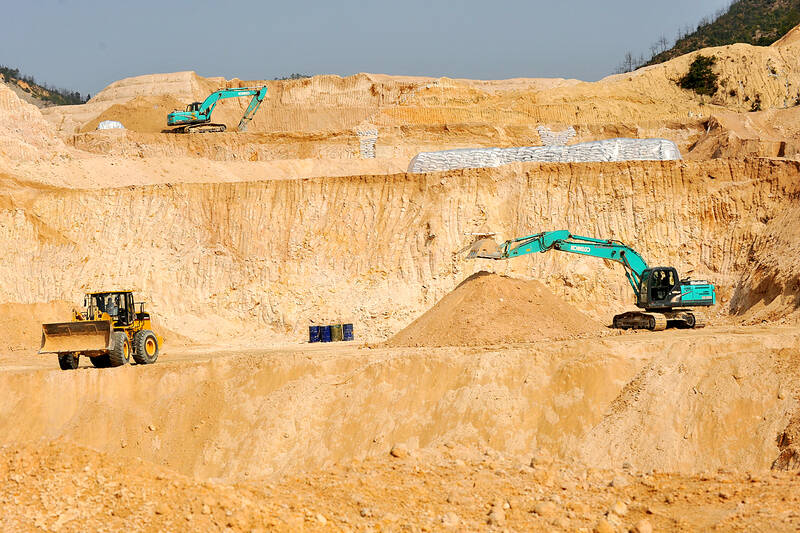China yesterday tightened its rare earth export controls, expanding restrictions on processing technology, and spelling out its intention to limit exports to overseas defense and semiconductor users.
The announcement from the Chinese Ministry of Commerce clarifies and expands sweeping controls announced in April that caused shortages around the world before a series of deals with Europe and the US eased, but did not eliminate, the supply crunch.
The controls are a major bargaining chip for China in its trade talks with the US, and the tightening comes weeks ahead of a possible face-to-face meeting between US President Donald Trump and Chinese President Xi Jinping (習近平) in South Korea.

Photo: AP
“From a geostrategic perspective, this helps with increasing leverage for Beijing ahead of the anticipated Trump-Xi summit in [South] Korea later this month,” said Tim Zhang, founder of Singapore-based Edge Research.
China produces more than 90 percent of the world’s processed rare earths and rare earth magnets. The 17 rare earth elements are vital materials in products ranging from electric vehicles to aircraft engines and military radars.
Restrictions on exporting the technology to make rare earth magnets would also be expanded to more types of magnets, and China is to limit some components and assemblies that contain restricted magnets.
China is the world leader in rare earth technology and equipment to recycle rare earths would now require a license to export, adding it to the long list of restricted processing technology.
The ministry’s announcement clarified for the first time some of the targets of China’s restrictions.
Overseas defense users would not be granted licenses, the ministry said, while applications related to advanced semiconductors would only be approved on a case-by-case basis.
A day earlier, US lawmakers called for broader bans on exports of chipmaking equipment to China.
China’s rare earth shipments have been growing steadily over the past few months as Beijing granted more export licenses, although some users still complain they are struggling to get them.
In a nod to concerns about access, the ministry said the scope of the items in its latest round of restrictions was limited and “a variety of licensing facilitation measures will be adopted.”
The new rules bar Chinese companies working with companies overseas on rare earths without permission from the ministry.
Manufacturers overseas using any Chinese components or machinery must also apply for licenses to export controlled items, the ministry said.

Taiwan’s foreign exchange reserves hit a record high at the end of last month, surpassing the US$600 billion mark for the first time, the central bank said yesterday. Last month, the country’s foreign exchange reserves rose US$5.51 billion from a month earlier to reach US$602.94 billion due to an increase in returns from the central bank’s portfolio management, the movement of other foreign currencies in the portfolio against the US dollar and the bank’s efforts to smooth the volatility of the New Taiwan dollar. Department of Foreign Exchange Director-General Eugene Tsai (蔡炯民)said a rate cut cycle launched by the US Federal Reserve

Handset camera lens maker Largan Precision Co (大立光) on Sunday reported a 6.71 percent year-on-year decline in revenue for the third quarter, despite revenue last month hitting the highest level in 11 months. Third-quarter revenue was NT$17.68 billion (US$581.2 million), compared with NT$18.95 billion a year earlier, the company said in a statement. The figure was in line with Yuanta Securities Investment Consulting Co’s (元大投顧) forecast of NT$17.9 billion, but missed the market consensus estimate of NT$18.97 billion. The third-quarter revenue was a 51.44 percent increase from NT$11.67 billion in the second quarter, as the quarter is usually the peak

The US government on Wednesday sanctioned more than two dozen companies in China, Turkey and the United Arab Emirates, including offshoots of a US chip firm, accusing the businesses of providing illicit support to Iran’s military or proxies. The US Department of Commerce included two subsidiaries of US-based chip distributor Arrow Electronics Inc (艾睿電子) on its so-called entity list published on the federal register for facilitating purchases by Iran’s proxies of US tech. Arrow spokesman John Hourigan said that the subsidiaries have been operating in full compliance with US export control regulations and his company is discussing with the US Bureau of

Pegatron Corp (和碩), a key assembler of Apple Inc’s iPhones, on Thursday reported a 12.3 percent year-on-year decline in revenue for last quarter to NT$257.86 billion (US$8.44 billion), but it expects revenue to improve in the second half on traditional holiday demand. The fourth quarter is usually the peak season for its communications products, a company official said on condition of anonymity. As Apple released its new iPhone 17 series early last month, sales in the communications segment rose sequentially last month, the official said. Shipments to Apple have been stable and in line with earlier expectations, they said. Pegatron shipped 2.4 million notebook